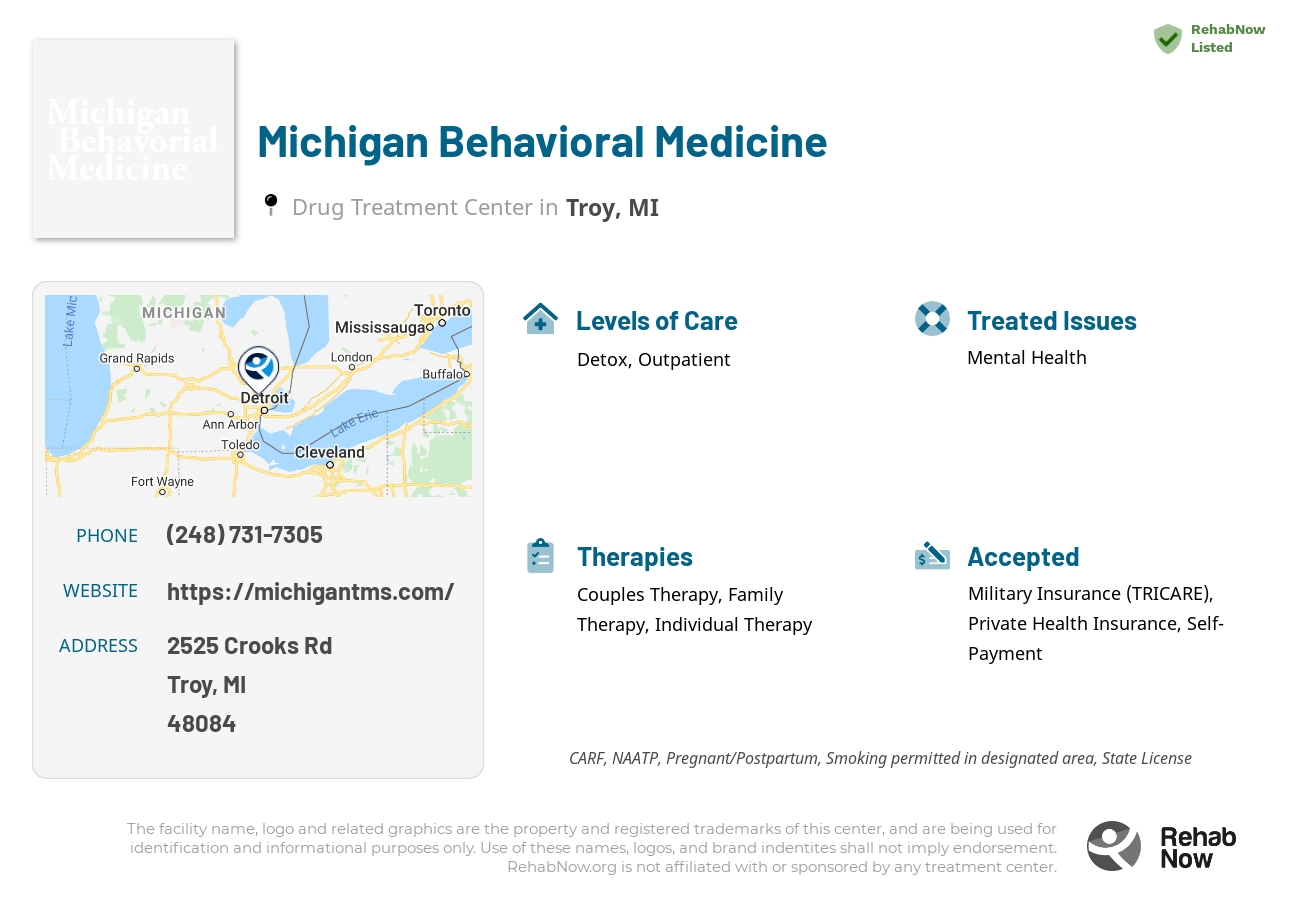
Michigan Behavioral Medicine
Drug Rehab Center in Troy, Michigan
- Mental Health
Michigan Behavioral Medicine is a mental health and addiction treatment clinic offering evidence-based approaches, specialized services, medication management, and a team of experienced clinicians dedicated to providing high-quality care to their clients in Troy, Michigan.
About Michigan Behavioral Medicine in Michigan
Michigan Behavioral Medicine is a mental health and addiction treatment clinic in Troy, Michigan that provides a wide range of services for individuals and families of all ages. They specialize in evidence-based treatment approaches for a variety of issues such as substance abuse, addiction, anxiety, depression, and trauma. Their team of experienced clinicians and counselors use a patient-centered approach to provide individualized treatment plans to help each individual make meaningful progress toward their goals.
At Michigan Behavioral Medicine, clients have access to a variety of specialized services to care for their mental health and substance abuse needs. Those seeking help with addiction or substance abuse can benefit from intensive outpatient treatment, which provides a comprehensive range of services such as individualized counseling, group support, and education on addiction and relapse prevention. In addition, they offer medication management services to help clients manage any medication-related issues associated with addiction treatment.
Michigan Behavioral Medicine is accredited by the Joint Commission and is licensed by the Michigan Department of Licensing and Regulatory Affairs. They also have a team of Board-Certified Psychiatrists that specialize in addiction and mental health treatment. They are dedicated to providing the highest quality of care to their clients using evidence-based practices and have received multiple awards from local and national organizations for their outstanding achievements in mental health and addiction treatment.
Genders
Ages
Modality
Additional
Conditions and Issues Treated
Levels of Care Offered
This center offers a variety of custom treatment tailored to individual recovery. Currently available are Detox, Outpatient, with additional therapies available as listed below.
Detox is an integral part of recovery and often very hard. Detoxification is the process of letting the body remove the drugs in it. It addresses the physical aspect of addiction. Detox from drugs can be unsafe as the patient undergoes withdrawal symptoms that range from headaches, vomiting, body aches to seizures and cardiac arrests. The main purpose of detox is to keep the drug users comfortable as the drugs leave their system.
Quitting cold turkey is not recommended and can lead to many issues. Detox is best done under medical supervision so that a team of experts can monitor the side effects and complications. Detox, alone, does not guarantee sobriety as the underlying psychological issues are not addressed.
Alcohol or drug addiction, or co-occurring disorders, are treated in an outpatient program. The patient must attend therapy and other programs at the facility but can return home each night.
Outpatient treatment allows recovering addicts to live at home while receiving addiction treatment. Outpatients can attend group sessions for a few hours per week. Outpatients may also continue to work full time and study/attend school without interruption if they choose.
Therapies & Programs
Different people react differently to various treatment options. Some drug rehabilitation centers offer individualized treatment that caters to the specific needs of a drug addict. The best treatment option varies on an individual depending on the type of drug abused, life history, medical condition of the person, social circumstances, and the environment they live in now.
When a person enters drug rehab, they usually have anti-drug associations such as withdrawal symptoms, stress, cravings, etc. The first step of drug rehab is to detoxify the body from any residual substances in it. Drug rehabilitation centers usually employ trained medical professionals to help in this process. Usually, the initial detoxification lasts for five days, where the person is monitored under close supervision.
Couples therapy is a treatment method used to help couples in which at least one member of the couple has a drug addiction. The treatment is designed to help the couple strengthen their relationship to minimize the effects of drug addiction on their lives and promote healthy communication between them.
Couples therapy can be used whether the addicted partner is using drugs or in recovery. It helps the couple create healthy communication and coping skills to minimize the problem-solving abilities of one partner, which can then be directed at solving issues related to their addiction. It also helps couples address problems that may be related to drug addiction. Couples therapy can help couples feel like a team and not feel like their partner is the problem.
Couples therapy is very challenging for both the drug addict and their partner. It requires an intense commitment between the two individuals to participate in the sessions and the homework assigned between sessions.
An additional benefit of couples therapy is that it can help make other types of treatment, such as 12-step programs, more effective.
Family therapy sessions typically involve the addict and their family members. During these sessions, a therapist will work with everyone involved to help them understand addiction and find healthy ways of coping without substance abuse.
Some addicts might feel embarrassed about their substance abuse problems. By encouraging family members to attend these sessions, therapists can show addicts that they’re not alone in dealing with addiction. Therapists can also work with family members to help them understand addiction and learn how to offer support and encouragement to their loved one as they deal with substance abuse issues.
Cognitive Behavioral Therapy is a type of psychotherapy that helps people address the thoughts and behaviors that may have led to their addiction. It also helps change negative thoughts into positive ones and promotes healthy communication between addicts and those around them. CBT is an efficient treatment for individuals suffering from all sorts of addictions.
Cognitive Behavioral Therapy (CBT) focuses on the underlying thoughts and behaviors that caused the problem of addiction in the first place and may cause a relapse. Negative feelings are common in drug abuse disorders, but they can lead to co-occurring disorders if not recognized. CBT involves strategies that help to change the behavior pattern by restructuring negative thoughts into positive ones. It helps to remove these feelings, and it provides long-term benefits. Also, CBT promotes self-awareness, self-control and can be administered as a mono-therapy or as part of combination therapy.
Payment Options Accepted
For specific insurance or payment methods please contact us.
Is your insurance accepted?
Ask an expert, call (888) 674-0062
Additional Details
Specifics, location, and helpful extra information.
Troy, Michigan 48084 Phone Number(248) 731-7305 Meta DetailsUpdated November 25, 2023
Staff Verified
Michigan Behavioral Medicine Patient Reviews
There are no reviews yet. Be the first one to write one.
Troy, Michigan Addiction Information
Michigan has the second-highest rate of drug and alcohol abuse in the nation. Heroin is linked to more than 50% of the state's hepatitis C cases. Marijuana is the drug most often associated with crimes in Michigan, followed by methamphetamines. Opioids alone are responsible for almost 20% of all drug overdose deaths in Michigan.
The community of Troy, Michigan, is being affected by drug addiction and abuse. Substance use disorders affect an estimated 11% of adults in Troy each year. About 1 in every 100 people in Troy will die from a drug-related overdose. These statistics underscore the importance of finding quality addiction treatment in Troy, MI, to help people struggling with substance abuse issues.
Treatment in Nearby Cities
- Southgate, MI (23.8 mi.)
- Oak Park, MI (6.8 mi.)
- Portage, MI (125.7 mi.)
- South Haven, MI (158.8 mi.)
- New Buffalo, MI (190.7 mi.)
Centers near Michigan Behavioral Medicine



The facility name, logo and brand are the property and registered trademarks of Michigan Behavioral Medicine, and are being used for identification and informational purposes only. Use of these names, logos and brands shall not imply endorsement. RehabNow.org is not affiliated with or sponsored by Michigan Behavioral Medicine.







